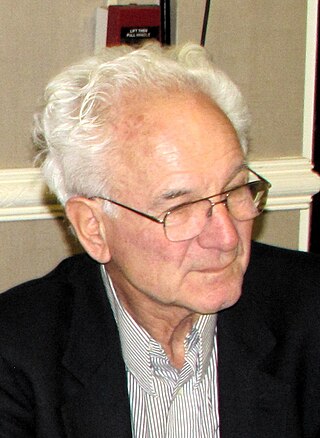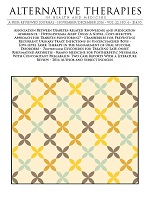Alternative medicine is any practice that aims to achieve the healing effects of medicine despite lacking biological plausibility, testability, repeatability, or evidence from clinical trials. Unlike modern medicine, which employs the scientific method to test plausible therapies by way of responsible and ethical clinical trials, producing repeatable evidence of either effect or of no effect, alternative therapies reside outside of medical science and do not originate from using the scientific method, but instead rely on testimonials, anecdotes, religion, tradition, superstition, belief in supernatural "energies", pseudoscience, errors in reasoning, propaganda, fraud, or other unscientific sources. Frequently used terms for relevant practices are New Age medicine, pseudo-medicine, holistic medicine, unorthodox medicine, fringe medicine, and unconventional medicine, with little distinction from quackery.

Peter H. Duesberg is a German-American molecular biologist and a professor of molecular and cell biology at the University of California, Berkeley. He is known for his early research into the genetic aspects of cancer. He is a proponent of AIDS denialism, the claim that HIV does not cause AIDS.

HIV/AIDS denialism is the belief, despite conclusive evidence to the contrary, that the human immunodeficiency virus (HIV) does not cause acquired immune deficiency syndrome (AIDS). Some of its proponents reject the existence of HIV, while others accept that HIV exists but argue that it is a harmless passenger virus and not the cause of AIDS. Insofar as they acknowledge AIDS as a real disease, they attribute it to some combination of sexual behavior, recreational drugs, malnutrition, poor sanitation, haemophilia, or the effects of the medications used to treat HIV infection (antiretrovirals).
The National Center for Complementary and Integrative Health (NCCIH) is a United States government agency which explores complementary and alternative medicine (CAM). It was initially created in 1991 as the Office of Alternative Medicine (OAM), and renamed the National Center for Complementary and Alternative Medicine (NCCAM) before receiving its current name in 2014. NCCIH is one of the 27 institutes and centers that make up the National Institutes of Health (NIH) within the United States Department of Health and Human Services.
A public health journal is a scientific journal devoted to the field of public health, including epidemiology, biostatistics, and health care. Public health journals, like most scientific journals, are peer-reviewed. Public health journals are commonly published by health organizations and societies, such as the Bulletin of the World Health Organization or the Journal of Epidemiology and Community Health. Many others are published by a handful of large publishing corporations that includes Elsevier, Wolters Kluwer, Wiley-Blackwell, Springer Science+Business Media, and Informa, each of which has many imprints. Many societies partner with such corporations to handle the work of producing their journals.

Stephen Joel Barrett is an American retired psychiatrist, author, co-founder of the National Council Against Health Fraud (NCAHF), and the webmaster of Quackwatch. He runs a number of websites dealing with quackery and health fraud. He focuses on consumer protection, medical ethics, and scientific skepticism.

Quackwatch is a United States-based website, self-described as a "network of people" founded by Stephen Barrett, which aims to "combat health-related frauds, myths, fads, fallacies, and misconduct" and to focus on "quackery-related information that is difficult or impossible to get elsewhere". Since 1996 it has operated the alternative medicine watchdog website quackwatch.org, which advises the public on unproven or ineffective alternative medicine remedies. The site contains articles and other information criticizing many forms of alternative medicine.

David J. Lipman is an American biologist who from 1989 to 2017 was the director of the National Center for Biotechnology Information (NCBI) at the National Institutes of Health. NCBI is the home of GenBank, the U.S. node of the International Sequence Database Consortium, and PubMed, one of the most heavily used sites in the world for the search and retrieval of biomedical information. Lipman is one of the original authors of the BLAST sequence alignment program, and a respected figure in bioinformatics. In 2017, he left NCBI and became Chief Science Officer at Impossible Foods.

Medical Hypotheses is a not-conventionally-peer reviewed medical journal published by Elsevier. It was originally intended as a forum for unconventional ideas without the traditional filter of scientific peer review, "as long as are coherent and clearly expressed" in order to "foster the diversity and debate upon which the scientific process thrives." The publication of papers on AIDS denialism led to calls to remove it from PubMed, the United States National Library of Medicine online journal database. Following the AIDS papers controversy, Elsevier forced a change in the journal's leadership. In June 2010, Elsevier announced that "submitted manuscripts will be reviewed by the Editor and external reviewers to ensure their scientific merit".
The Journal of the Royal Society of Medicine is a peer-reviewed medical journal. It is the flagship journal of the Royal Society of Medicine with full editorial independence. Its continuous publication history dates back to 1809. Since July 2005 the editor-in-chief is Kamran Abbasi, who succeeded Robin Fox who was editor for almost 10 years.
Functional medicine is a form of alternative medicine that encompasses a number of unproven and disproven methods and treatments. Its proponents claim that it focuses on the "root causes" of diseases based on interactions between the environment and the gastrointestinal, endocrine, and immune systems to develop "individualized treatment plans." It has been described as pseudoscience, quackery, and at its essence a rebranding of complementary and alternative medicine.

Natural Standard is an international research collaboration that systematically reviews scientific evidence on complementary and alternative medicine. Together with the faculty of Harvard Medical School, Natural Standard provides consumer information on complementary and alternative medicine for Harvard Health Publications and Susan G. Komen for the Cure. Natural Standard also provides information on herbal medicine and dietary supplements to MedlinePlus, which is produced and maintained by the U.S. National Library of Medicine (NLM) and the National Institutes of Health (NIH).

Nature Communications is a peer-reviewed, open access, scientific journal published by Nature Portfolio since 2010. It is a multidisciplinary journal and it covers the natural sciences, including physics, chemistry, earth sciences, medicine, and biology. The journal has editorial offices in London, Berlin, New York City, and Shanghai.
Wallace Sampson, also known as Wally, was an American medical doctor and consumer advocate against alternative medicine and other fraud schemes. He was an authority in numerous medical fields, including oncology, hematology, and pathology. He was Emeritus Professor of Clinical Medicine at Stanford University. He was the former Head of Medical Oncology at Santa Clara Valley Medical Center, and a member of the faculty at the Skeptic's Toolbox 1998–2008.
Scientific Reports is a peer-reviewed open-access scientific mega journal published by Nature Portfolio, covering all areas of the natural sciences. The journal was established in 2011. The journal states that their aim is to assess solely the scientific validity of a submitted paper, rather than its perceived importance, significance, or impact.
Scholarly peer review or academic peer review is the process of having a draft version of a researcher's methods and findings reviewed by experts in the same field. Peer review is widely used for helping the academic publisher decide whether the work should be accepted, considered acceptable with revisions, or rejected for official publication in an academic journal, a monograph or in the proceedings of an academic conference. If the identities of authors are not revealed to each other, the procedure is called dual-anonymous peer review.
Frontiers Media SA is a publisher of peer-reviewed, open access, scientific journals currently active in science, technology, and medicine. It was founded in 2007 by Kamila and Henry Markram, and has since expanded to other academic fields. Frontiers is based in Lausanne, Switzerland, with other offices in London, Madrid, Seattle and Brussels. In 2022, Frontiers employed more than 1,400 people, across 14 countries. All Frontiers journals are published under a Creative Commons Attribution License.

Science-Based Medicine is a website and blog with articles covering issues in science and medicine, especially medical scams and practices. Founded in 2008, it is owned and operated by the New England Skeptical Society and run by Steven Novella and David Gorski.

Alternative Therapies in Health and Medicine is a bimonthly peer-reviewed medical journal covering alternative medical treatments. It publishes case reports, original research papers, and systematic reviews. It was established in 1995 by founding editor Larry Dossey and is published bimonthly by InnoVision Health Media. The current editor-in-chief is Andrew W. Campbell.
Alternative medicine describes any practice which aims to achieve the healing effects of medicine, but which lacks biological plausibility and is untested or untestable. Complementary medicine (CM), complementary and alternative medicine (CAM), integrated medicine or integrative medicine (IM), and holistic medicine are among many rebrandings of the same phenomenon.









